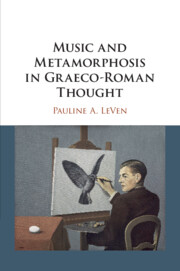Book contents
- Music and Metamorphosis in Graeco-Roman Thought
- Music and Metamorphosis in Graeco-Roman Thought
- Copyright page
- Dedication
- Contents
- Acknowledgments
- Abbreviations
- Introduction
- Chapter 1 Forest: On Surrounds
- Chapter 2 Ringdove: On the Uncanny Power of Performance
- Chapter 3 Cicadas: On the Voice
- Chapter 4 Echo: On Listening
- Chapter 5 Reeds: On Musical Objects
- Chapter 6 Nightingale: On Expression
- Chapter 7 Beetle: On Rhythm
- References
- Citations Index
- Subject Index
Chapter 1 - Forest: On Surrounds
Published online by Cambridge University Press: 25 November 2020
- Music and Metamorphosis in Graeco-Roman Thought
- Music and Metamorphosis in Graeco-Roman Thought
- Copyright page
- Dedication
- Contents
- Acknowledgments
- Abbreviations
- Introduction
- Chapter 1 Forest: On Surrounds
- Chapter 2 Ringdove: On the Uncanny Power of Performance
- Chapter 3 Cicadas: On the Voice
- Chapter 4 Echo: On Listening
- Chapter 5 Reeds: On Musical Objects
- Chapter 6 Nightingale: On Expression
- Chapter 7 Beetle: On Rhythm
- References
- Citations Index
- Subject Index
Summary
Yet this idea of “nature” or the “animated world” producing lovely sounds understood by humans as “music” is anything but self-evident. Like Gardiner, we might understand it readily today, but this idea is the fruit both of a long history and of a particular moment in time – a long history of conceptualizing animal and elemental sounds (no matter how pleasant) metaphorically (and metaphorically only) as music, and a particular, very recent, moment of human composers, musicians, and scientists treating birdsongs and other natural sounds as music, even working with them compositionally, rather than representing or suggesting them through human musical means, or treating them as a source of inspiration or an object of intervention for humans.
- Type
- Chapter
- Information
- Music and Metamorphosis in Graeco-Roman Thought , pp. 10 - 51Publisher: Cambridge University PressPrint publication year: 2020

